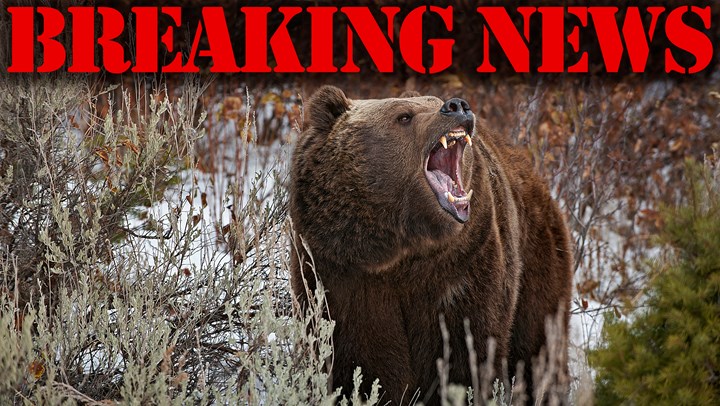
by Phil Phillips - Saturday, April 15, 2017

The Humane Society of the United States (HSUS) and its cohorts are at it again—or still—this time in British Columbia, Canada, as they campaign to close grizzly bear hunting throughout the province. Step No. 1: to end grizzly hunting in the province’s Great Bear Rainforest (GBR) along the coast by making sure the ultra-liberal New Democratic Party (NDP) wins the B.C. general election on May 9.
“A B.C. NDP government will do what’s right and end the grizzly trophy hunt,” said John Horgan, leader of the B.C. New Democrats, in an online letter asking B.C. residents to lend their names in support, adding that bear viewing “generates millions of dollars more than trophy hunting.”
As for how anti-hunters gained traction, years ago the government advised them that if they were against grizzly hunting to buy the land—willing buyer, willing seller. According to guide outfitter Bob Milligan of Milligan’s Outfitting—operator of the largest B.C. guide area for sheep, mountain goats, black bears and grizzly bears—the antis bought outfitter Leonard Ellis’ guide area in 2005, one of the largest besides Milligan’s, for $3.5 million. “They retired the grizzly quota and put grizzly hunting out of reach there,” Milligan explained. “The HSUS and other anti-hunting groups are trying to buy more guide territories along the coast.”
“The antis are using the words ‘trophy hunting’ to mask the truth that hunting is conservation and spin hunting as an atrocity,” Milligan said. “But the Natives have been doing it for hundreds of years here and wear their grizzly claws and skins. In fact, one of the best-known B.C. guides for grizzlies is a Native from Bella Coola. So the HSUS smells blood and backs the Raincoast Conservation Foundation and every other anti-hunting group that tries to retire the grizzly quota, but as they try and demonize non-resident hunters, they ignore that Natives will continue to hunt grizzlies and have considerable clout—and they are voters.”
“The antis are using the words ‘trophy hunting’ to mask the truth that hunting is conservation and spin hunting as an atrocity.” Scott Ellis (no relation to Leonard), executive director of the Guide Outfitters Association of British Columbia (GOABC), explains, “The anti-hunters have been strategic over the past 10-plus years after buying Ellis’ guide area. They immediately began working with local First Nations and B.C. bear-viewing operators to increase local support in favor of closing areas to grizzly hunting for nonresidents."
I personally can attest to the success of these grizzly viewing stations and lodges. Nearly 20 years ago there was a viewing operation below the guide area I was trying to buy between Vancouver Island and the mainland on B.C.’s Knight’s Inlet. Today operations such as Tweedsmuir Park Lodge in Bella Coola are promoted by the Canadian Tourism Commission as offering a “signature experience” when it comes to seeing and photographing grizzlies.
“So now the bear-viewing industry is against us and is partnering with NGOs [non-governmental organizations],” added GOABC’s Ellis (no relation to Leonard Ellis). “While GOABC is apolitical, we’re heading into a provincial election, and the official opposition [NDP] has announced it will close grizzly bear hunting for nonresidents. This puts significant pressure on the GOABC.” The B.C. Liberal Party (current government) seems to be caving to pressure.
Stating, “We must operate in the principle of conservation first in order to pass on B.C.’s natural splendor so future generations can enjoy it,” the liberal platform ignores that hunting is what funds conservation and wildlife management. The fact is that large boars are the bears that are targeted. Taking mature boars out of the population actually can increase the number of bears because boars will kill the cubs and, in some cases, the sow as she tries to protect them. When a sow loses her cubs she will be ready to mate again.
Facts Show the B.C. Grizzly Population is Healthy
The B.C. government estimates there are 15,000 grizzlies in the province and reports that an average of 300-350 are taken each year. The population and harvest are very stable. When it comes to those who oppose the hunt, grizzly bear science and provincial law don’t seem to matter—and everyone is an expert. With bear hunting once again a hot political issue, the fate of the grizzly bear hunt may be decided in the provincial election on May 9.
As someone who has hunted B.C. grizzlies, I have experienced the scientifically-based controlled hunting that currently exists. I was fortunate to go on a B.C. grizzly hunt of my own with Bob Milligan in 2008. We saw numerous bears, and a friend and I both took mature boars in a five-day period. A few years later I returned for a black bear hunt and booked a grizzly bear hunter to join me and Milligan. The hunter took the world-record muzzleloader grizzly on the very first evening. Case in point: There is no shortage of mature grizzlies on the province. Hunting them not only benefits the bear population, but it brings welcome revenue to the people of British Columbia.
Attention Nonresident Hunters
Based on strong science and sound laws, British Columbia’s management of grizzly bears is a success story in which the province can take pride. For the facts on sustainable use and/or to lend your support in GOABC’s efforts to protect nonresidents’ right to hunt B.C. grizzlies—whether or not you personally have hunted or plan to hunt a B.C. grizzly—visit www.bearsinbc.com.
E-mail your comments/questions about this site to:
[email protected]
